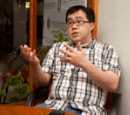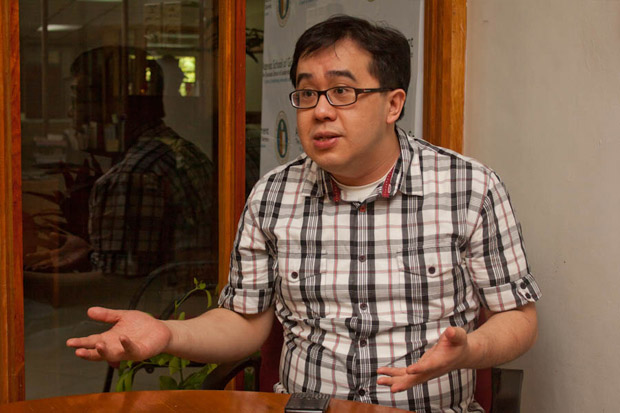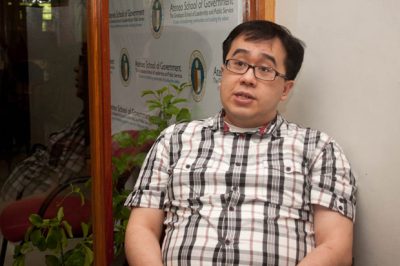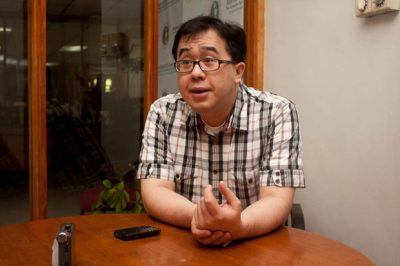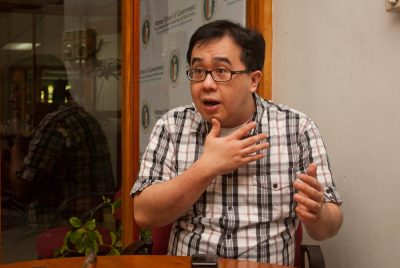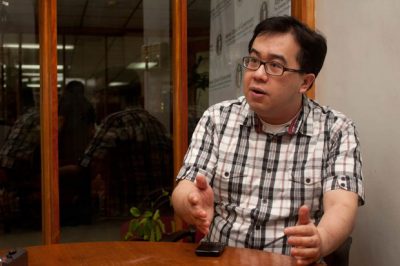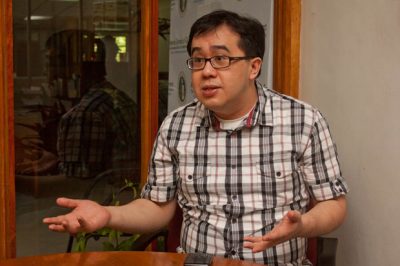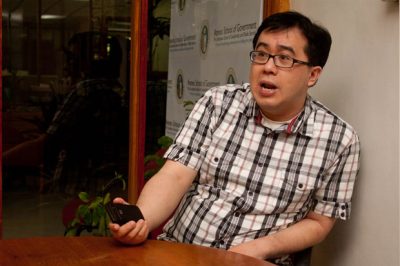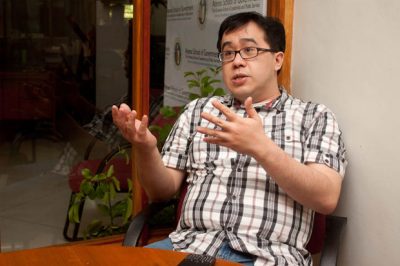As an officer of a service-oriented Atenean organization for the past three years, senior student Elaine* is quite appalled with what she sees to be a typical trend: the diminishing number of members who participate in the volunteer efforts of her group.
“I can recall a time when we [had] to cancel [an] event because we were so undermanned,” recounts Elaine. She says that in the mentioned affair, less than ten volunteers, aside from the org’s executive board members, came.
It was not her first time to have gone through such an experience. She cannot forget a similar incident during her freshmen year, where only six students showed up for an Alternative Class Program that had managed to make up to fifty students commit during sign-ups.
Given the fact that Elaine’s organization had originated purely from student initiative, she cannot help but feel resentful about the current state of student volunteerism in the Ateneo.
Involvement by the numbers
According to the Council of Organizations of the Ateneo (COA) President Kenneth Abante, Sector-Based Cluster and Faith Formation Cluster organizations have had “record high” membership over the past semester. Statistics from COA show that the number of Ateneans who signed up for organizations increased from 87% in 2010 to 92.3% in 2011.
However, it seems that COA’s numbers do not reflect the current dynamics of student volunteerism in the Loyola Schools.
Although Kaingin Area Head, Erika Tuprio, was surprised by the large number of members who turned up during her organization’s first general assembly, she admits that there remains to be issues with regard to actual member involvement.
“Only a small fraction [of Kaingin’s members] attend our area insertions. I was hoping that more members would be motivated [to join].”
Mindful of the fact that member inactivity has been a significant problem for many student orgs, Abante says that COA is doing a benchmark study on the actual number of active organization members. He says that the study would be accomplished by the end of the school year.
Reservations and distractions
Michael Liberatore, an instructor with the Theology Department, says that a difficult challenge many Atenean volunteer groups face is the fact that their members are assigning significantly higher priorities towards academics.
“[Volunteerism] is just in their periphery of what they think is important,” he says. “You know, they’re focused on their careers, they’re focused on what they need to do to get ahead—they don’t see service as part of that.”
Believing that the university has provided a “fair amount of volunteerism opportunities,” Liberatore adds that students have passively accepted the notion that everything is secondary to achieving a high grade. He says that as a consequence, a significant number of students fail to consider the wealth of experience brought about by service-oriented volunteerism.
For Acts of Hope Foundation, Inc. President Harvey Keh, another reason for the less-than-ideal levels of volunteerism among the youth is the myriad of distractions that are available to them, such as the Internet and social media.
“The challenge is to transform these distractions into ways that will encourage the youth to take part in nation-building,” he says. “You have to be social media savvy to get the young people; it’s cool and hip and good.”
“Ateneo is a bubble”
Elaine and Tuprio also believe that Atenean stereotypes have much to do with the university’s current state of volunteerism.
“We have a tendency to be pessimistic,” says Tuprio. “[We feel] that nothing will happen [despite our efforts].”
Elaine agrees with Tuprio, but goes a bit further: “Admit it or not, Ateneo is a bubble. That is why we do not do anything.”
For Keh, however, it is exactly the Ateneo context that should be the reason why Ateneans volunteer. Unlike most other Filipino college students who have to deal with the stress of securing finances for their next tuition payment, most Ateneans are living quite comfortable lives.
“You have been gifted with that,” he says. “It is a sin if you do not volunteer and just spend all of your free time in Red Mango or Mercato.”
Tuprio agrees. “[Volunteering is] the least you can do for those who don’t have much. We are lucky enough to have the education, the food that we eat every day, the shelter. Everything we need is already provided.”
A lost generation?
Specializing on the sociology of religion and the youth, sociologist and Developmental Studies lecturer Jayeel Cornelio, PhD says that although social class is an important indicator, it cannot be taken as the primary gauge of involvement in volunteerism.
“The greater question is: what is going on with the generation itself? The youth generation born in the 1990s, growing up in 2011 with technology booming, and [with] no idea of what Martial Law is like?” he says.
In one of his papers, Cornelio argued that the Filipino youth belongs to a sociologically isolated generation—a result of their “powerlessness” that had been brought about by widespread family restructuring, economic vulnerability and political disengagement. He sees this, however, as a cause for the Filipino youth to be active in volunteerism, due to “political individualization.”
“As more and more young people feel powerless in the public sphere, they find avenues where they can feel the power—one of [these avenues] is through these volunteer groups,” he says.
He says that compared to the martial law era, there is currently no common enemy that unifies the different social classes. Hence, volunteerism, in its modern dynamic, becomes an option for those with a personal advocacy.
Learned helplessness
For Christian Union for Socialist and Democratic Advancement (Crusada) President James Roman, the real problem for volunteerism in the context of the Ateneo is the “learned helplessness,” or the defeatist manner, with which people view the “stereotypical” Atenean traits of apathy and indifference.
He does not agree with these stereotypes. “It just so happens that there are not that much avenues where [Ateneans] can go to when they have certain interests,” he says.
Roman believes that these defeatist attitudes have to be changed.
“It is hard to fight disempowerment and disengagement because it is embedded and entrenched into the minds of Filipinos. How do we fight that?” he asks. “The learned helplessness can be combated with a realization of our duty to the nation.”
Beyond requirements
In the Ateneo, volunteerism is integrated in the curriculum in the form of InTACT, NSTP, and other such programs.
However, Roman believes that the policy of requiring volunteerism for the student body is problematic.
“[Helping] becomes an obligation for us to fulfill a school requirement,” he says. “It should be the other way around. The formation program does not teach us the initiative to help.”
Elaine echoes Roman’s sentiments. She believes that the Office of Social Concern and Involvement (OSCI) and the Integrated Non-Academic Formation (INAF) program desensitize the students with the repetition of social reality.
Keh, on the other hand, maintains that required participation in social service is good in that it hits people both in their heads and in their hearts.
“When you talk about public education [in the classroom],” he says, “many Ateneans haven’t even stepped into a public school classroom. You do not feel it.”
Drawing from his years of experience in teaching Theology 141, Liberatore says that it is okay for Ateneans to look at the program as “forced service.” He compares “forced volunteerism” to academics: “Most students will not pick up the readings for their classes and read them for fun. But [students] are forced to because we think you’re going to grow as a result of reading them.”
Faces of volunteerism
In the Ateneo, two faces of voluntary work are evident—one is direct social work, and the other is political involvement. The former is best typified by Faith Formation Cluster orgs, Sector-Based Cluster orgs, and specialized orgs such as Alay ni Ignacio and Gawad Kalinga Ateneo. The latter includes some of the Issue and Policy Analysis cluster orgs and the student political parties.
These two kinds of volunteerism are perceived to be quite distinct. In the Ateneo, though, it is clear that political activism has less appeal to most students compared to direct social work.
However, Liberatore disagrees with the notion that political activism is unfruitful and worthless. “Some might say, ‘I’d much rather work with this community, because at least there’s something meaningful coming out of this,’” he says, “but you know, eventually you have to face the beast.”
In this light, Roman believes that, even though Crusada members have been derided as “annoying” and “elitist” by the party’s critics, they do not need to sugarcoat their political activism; doing that would just defeat the purpose.
The desire to volunteer
For Keh, despite the perceived lack of volunteerism among Ateneans, the involvement levels are still something to be optimistic about.
“I think there is a desire [for volunteerism]. Remember the Ako Mismo campaign [a few years ago]? There were many who signed up,” he says. He believes that good-hearted Ateneans are still willing to help out, given the opportunity.
Cornelio mirrors Keh’s sentiments. He believes that volunteerism is not necessarily in a decline.
He says: “The fact that there are high membership rates in organizations denotes that people still want to be involved somewhere, somehow.”
*Name has been withheld by request

